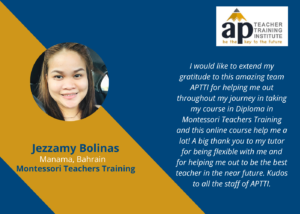Montessori Teacher Training Course: Embracing Innovation and Advancements
There is a continuous process of change occurring in the field of education, with new instructional strategies and technology being introduced regularly. It is crucial for educators who follow the Montessori method to remain up to date with these changes to guarantee that they are providing their kids with the most optimal learning environment the Montessori method has to offer. Montessori Teacher Training course are critical since they provides educators with the knowledge and abilities they require to incorporate these innovations into their teaching practices. This article aims to investigate how Montessori Teacher Training programs stay abreast of the most recent advancements in the field of education. This helps to ensure that teachers are always at the forefront of innovation.
How do Montessori programs incorporate new teaching methodologies?
The Montessori Teacher Training programs are designed to be dynamic and adaptive, using the most recent teaching approaches as they become available. To incorporate the most recent findings from research on child development and education, these programs regularly revise their course offerings. For instance, contemporary research on brain development and different learning styles is incorporated into Montessori Teacher Training courses. This helps to ensure that educators are equipped with the most up-to-date information possible. With this strategy, educators can gain a deeper understanding of the requirements of their pupils and modify their instructional strategies accordingly.
Are Montessori Teacher Training courses available online?
In response to your question, yes, a significant number of Montessori Teacher Training courses are now offered online, giving prospective educators with flexibility and accessibility. The curriculum of online teacher training programs is just as rigorous as that of traditional, in-person courses; however, the additional benefit of being able to attend the program from any location is a significant additional benefit. This trend towards online teacher training has shown to be especially advantageous during times when educators can’t attend classes in person. This has ensured that educators can continue their professional development without any interruptions.
How do training institutes ensure the quality of online courses?
To ensure that its online Montessori Teacher Training courses continue to meet the highest standards of quality, a teacher training institute takes several precautions. Regular assessments, live virtual classrooms, and interactive modules are some of the methods that are included in these measures to monitor development. Furthermore, online courses frequently have practical components that allow students to apply what they have learned in the classroom to real-world scenarios. These practical components might take the form of virtual simulations or practice sessions that take place in person. It is the goal of these programs to guarantee that teachers are adequately equipped to properly execute the Montessori method by integrating theoretical knowledge with practical application.
How are new technologies integrated into Montessori Teacher Training?
The Montessori Teacher Training programs are not an exception to the rule that has been established that technological improvements play a key part in modern education. Currently, there are modules in Teacher Training courses that focus on incorporating technology into the classroom. These modules include topics such as the utilization of educational software, interactive whiteboards, and other digital tools to improve learning. These technologies have the potential to assist in the creation of learning settings that are more dynamic and engaging, which is in accordance with the Montessori ideals of self-directed, hands-on classroom instruction. The Montessori Teacher Training programs guarantee that educators are equipped to utilize technology in ways that complement and enrich the Montessori approach by providing them with the opportunity to become familiar with the tools that are used in instruction.
How do programs address the diverse needs of students?
When it comes to recognizing and catering to the various requirements of pupils, Montessori Teacher Training programs pay a significant amount of attention. This entails training on inclusive education approaches, cultural competence, and differentiation tactics in order to cater to the need of all students. It is the responsibility of teacher training institutes to guarantee that Montessori educators are competent to create learning environments that are inclusive and supportive by incorporating these factors into their training. Taking this approach is consistent with the Montessori philosophy, which emphasizes the need of recognizing and fostering the uniqueness of each child.
What role do continuous professional development and collaboration play?
Continuous professional development and teamwork are two essential elements that are included in the Montessori Teacher Training program. Training programs enable educators to continue their education and give them with opportunities to interact with their colleagues, discuss and share effective teaching strategies, and remain current on the most recent developments in the field of education. Montessori educators have the opportunity to maintain their professional development and polish their abilities through a variety of means, including but not limited to attending conferences, workshops, and online forums. Montessori educators are guaranteed to maintain their expertise and efficiency throughout their careers thanks to the culture of continual improvement that exists within the community.
How do Montessori Teacher Training programs stay connected to educational research?
It is imperative that Montessori Teacher Training programs retain strong linkages to the most recent educational research in order to guarantee that their curriculum continues to be successful and relevant. This is accomplished by forming collaborations with educational institutions, taking part in educational research projects, and keeping up with the latest publications in the field of education. By ensuring that their training is grounded in the most recent research, these programmes ensure that Montessori educators are armed with techniques and practices that are supported by evidence. This dedication to training that is motivated by research helps to ensure that the high standards of Montessori education are maintained and equips teachers to handle the obstacles that are present in today’s academic environments.
In conclusion, Montessori Teacher Training programs are dedicated to staying abreast of the most recent developments and advances in the field of education. By ensuring that Montessori educators are well-prepared to provide high-quality and effective education, these programs ensure that the curriculum is continuously updated, that new technologies are incorporated, that online training is made available, and that a strong emphasis is placed on diversity and inclusion. By placing an emphasis on research-based practices and ongoing professional development, Montessori Teacher Training is able to further enhance its effectiveness. This helps to ensure that educators continue to be at the forefront of educational innovation.






